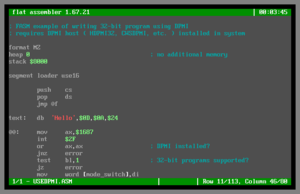FASM

FASMD – MS-DOS version with IDE
|
|
| Developer(s) | Tomasz Grysztar |
|---|---|
| Initial release | March 2000 |
| Stable release |
1.71.54 / June 9, 2016
|
| Operating system | MS-DOS and IDE, Windows and IDE, Unix-like (Linux, OpenBSD, etc.), MenuetOS, KolibriOS, OctaOS, DexOS and IDE, SkyOS, Solar_OS |
| Platform | x86, x86-64 |
| Type | Assembler |
| License | Simplified BSD with a weak copyleft clause |
| Website | flatassembler |
FASM (flat assembler) is an assembler for x86 processors. It supports Intel-style assembly language on the IA-32 and x86-64 computer architectures. It claims high speed, size optimizations, operating system (OS) portability, and macro abilities. It is a low-level assembler and intentionally uses very few command-line options. It is free and open-source software.
All versions of FASM can directly output any of the following: flat "raw" binary (usable also as MS-DOS COM executable or SYS driver), objects: Executable and Linkable Format (ELF) or Common Object File Format (COFF) (classic or MS-specific), or executables in either MZ, ELF, or Portable Executable (PE) format (including WDM drivers, allows custom MZ DOS stub). An unofficial port targeting the ARM architecture (FASMARM) also exists.
The project was started in 1999 by Tomasz Grysztar, a.k.a. Privalov, at that time, an undergraduate student of mathematics from Poland. It was released publicly in March 2000. FASM is completely written in assembly language and comes with full source. It is self-hosting and has been able to assemble itself since version 0.90 (May 4, 1999).
FASM originally only ran in 16-bit flat real mode. 32-bit support was added and then supplemented with optional DPMI support. It was written in a way that made it easy to port to any operating system that allowed flat 32-bit addressing; it was ported to Windows and then Linux.
...
Wikipedia
